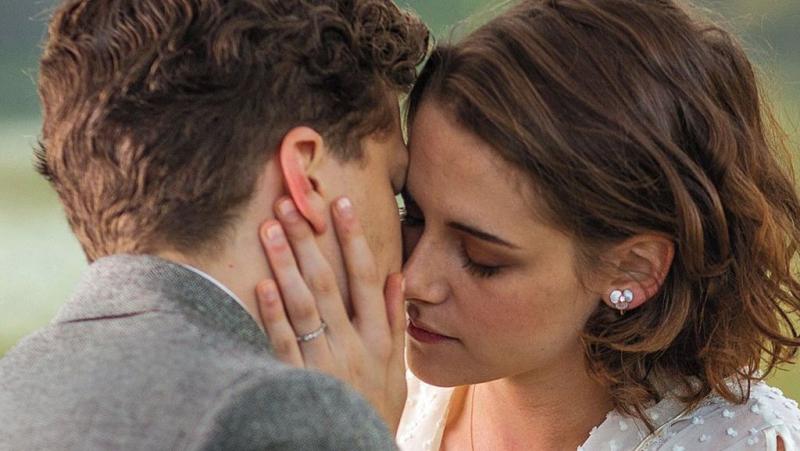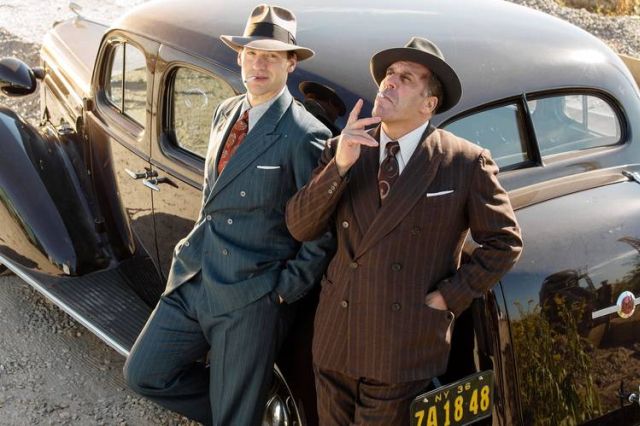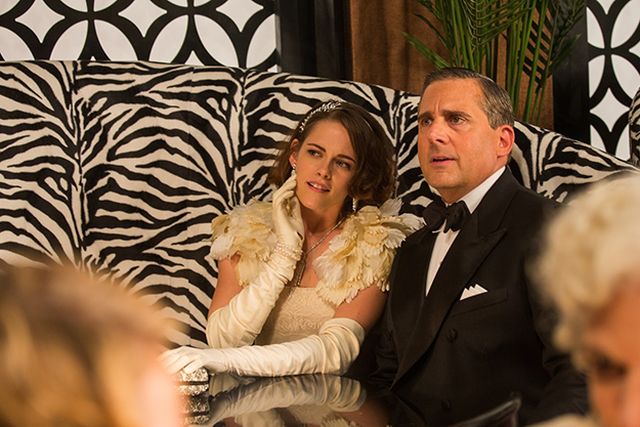Café Society | reviews, news & interviews
Café Society
Café Society
Woody Allen's latest ravishes the eye and, at times, the heart

Whatever one thinks of Café Society - and responses to Woody Allen's latest as ever are likely to be divided - few will dispute the visual lustre that the legendary cameraman Vittorio Storaro has brought to this tale of love upended and deferred, set in 1930s Hollywood to a period-perfect soundtrack pulsing with the music of Rodgers and Hart.
Every frame has a ready-made, natural shimmer that communicates Allen's love affair with the cinema, however one responds to a narrative about displaced nebbish Bobby Dorfman (Allen soundalike Jesse Eisenberg), who falls hard for LA glamour girl Vonnie (a radiant Kristen Stewart), a one-time Nebraskan who by the final credits has against the odds become Bobby's aunt.
That might sound like a sort of inverted commentary on Allen's much-debated personal life, but it's possible to look past the writer-director's circumstances in a story which exerts an unexpected emotional pull. The ending, set on the cusp of a new year, finds its leading players casting a ruminative, regretful glance back at their pasts.
 Allen devotees, too, will note the shift in perspective between the mockery to which a sunlit, soulless Hollywood is subjected in Annie Hall and the dreamscape captured so easefully by Storaro here. With Bobby we look on in wonder at a realm in which the likes of Joan Blondell and Adolphe Menjou are only an unseen phone call or canapé away, while Bobby's gangster-brother Ben (Corey Stoll, pictured above with Saul Stein) casually cuts short the lives of all and sundry on his grubby home turf.
Allen devotees, too, will note the shift in perspective between the mockery to which a sunlit, soulless Hollywood is subjected in Annie Hall and the dreamscape captured so easefully by Storaro here. With Bobby we look on in wonder at a realm in which the likes of Joan Blondell and Adolphe Menjou are only an unseen phone call or canapé away, while Bobby's gangster-brother Ben (Corey Stoll, pictured above with Saul Stein) casually cuts short the lives of all and sundry on his grubby home turf.
The boys' echt-Jewish mother Rose (Jeannie Berlin, terrific) clocks but doesn't want to address how exactly it is that Ben spends his days. That, in turn, makes the itinerant Bobby's screen outings with Vonnie to catch the latest from Barbara Stanwyck seem a welcome alternative - at least for a while - to shadier goings-on back east, and Allen gets considerable comic mileage out of the disparity between Rose's beer-swilling, cantankerous husband (the wonderful Ken Stott) in the Bronx and the swellegant poolside environs newly available to Bobby. Eisenberg plays the perennial Allen surrogate with an open-faced gentleness that couldn't be further from the self-immolating distress he brought to his recent London stage turn in The Spoils.
 The twist, of course, is that a glistening LA casts its own confusion and gloom when it transpires that Bobby's beloved Vonnie is in fact the mistress of Bobby's long-married Uncle Phil (Steve Carell, ably inheriting a role earmarked for Bruce Willis), the hot-shot agent who ends up taking Bobby under his wing, with Vonnie the appointed guide to his newfound home. The resolution lands both young lovers with a more-than-acceptable mate, even as they can't help but ponder the road not taken. Bobby, we're informed, has "a touch of the poet" about him (note the O'Neill reference), but the narrative, one feels, wouldn't be out of place in Chekhov.
The twist, of course, is that a glistening LA casts its own confusion and gloom when it transpires that Bobby's beloved Vonnie is in fact the mistress of Bobby's long-married Uncle Phil (Steve Carell, ably inheriting a role earmarked for Bruce Willis), the hot-shot agent who ends up taking Bobby under his wing, with Vonnie the appointed guide to his newfound home. The resolution lands both young lovers with a more-than-acceptable mate, even as they can't help but ponder the road not taken. Bobby, we're informed, has "a touch of the poet" about him (note the O'Neill reference), but the narrative, one feels, wouldn't be out of place in Chekhov.
Stewart, on this evidence, would make a natural Yelena in Uncle Vanya, and her performance is the revelation here, as Vonnie shuttles between Bobby and Phil, alive to the needs of both men yet dulled on some level to doubts she clearly harbours within and about herself. Playing an ad hoc philosopher who puts her life up for examination but only to a point, the actress finds a soulmate of sorts in Storaro, who gives Vonnie the shimmering entrance of anyone's dreams. And if Allen is heard but not seen in an intermittent narration, he continues to gift his performers with unanticipated grace notes, none more so than a leading lady whose triumph in society comes tempered by a sense of loss.
Whatever one thinks of Café Society - and responses to Woody Allen's latest as ever are likely to be divided - few will dispute the visual lustre that the legendary cameraman Vittorio Storaro has brought to this tale of love upended and deferred, set in 1930s Hollywood to a period-perfect soundtrack pulsing with the music of Rodgers and Hart.
Every frame has a ready-made, natural shimmer that communicates Allen's love affair with the cinema, however one responds to a narrative about displaced nebbish Bobby Dorfman (Allen soundalike Jesse Eisenberg), who falls hard for LA glamour girl Vonnie (a radiant Kristen Stewart), a one-time Nebraskan who by the final credits has against the odds become Bobby's aunt.
That might sound like a sort of inverted commentary on Allen's much-debated personal life, but it's possible to look past the writer-director's circumstances in a story which exerts an unexpected emotional pull. The ending, set on the cusp of a new year, finds its leading players casting a ruminative, regretful glance back at their pasts.
 Allen devotees, too, will note the shift in perspective between the mockery to which a sunlit, soulless Hollywood is subjected in Annie Hall and the dreamscape captured so easefully by Storaro here. With Bobby we look on in wonder at a realm in which the likes of Joan Blondell and Adolphe Menjou are only an unseen phone call or canapé away, while Bobby's gangster-brother Ben (Corey Stoll, pictured above with Saul Stein) casually cuts short the lives of all and sundry on his grubby home turf.
Allen devotees, too, will note the shift in perspective between the mockery to which a sunlit, soulless Hollywood is subjected in Annie Hall and the dreamscape captured so easefully by Storaro here. With Bobby we look on in wonder at a realm in which the likes of Joan Blondell and Adolphe Menjou are only an unseen phone call or canapé away, while Bobby's gangster-brother Ben (Corey Stoll, pictured above with Saul Stein) casually cuts short the lives of all and sundry on his grubby home turf.
The boys' echt-Jewish mother Rose (Jeannie Berlin, terrific) clocks but doesn't want to address how exactly it is that Ben spends his days. That, in turn, makes the itinerant Bobby's screen outings with Vonnie to catch the latest from Barbara Stanwyck seem a welcome alternative - at least for a while - to shadier goings-on back east, and Allen gets considerable comic mileage out of the disparity between Rose's beer-swilling, cantankerous husband (the wonderful Ken Stott) in the Bronx and the swellegant poolside environs newly available to Bobby. Eisenberg plays the perennial Allen surrogate with an open-faced gentleness that couldn't be further from the self-immolating distress he brought to his recent London stage turn in The Spoils.
 The twist, of course, is that a glistening LA casts its own confusion and gloom when it transpires that Bobby's beloved Vonnie is in fact the mistress of Bobby's long-married Uncle Phil (Steve Carell, ably inheriting a role earmarked for Bruce Willis), the hot-shot agent who ends up taking Bobby under his wing, with Vonnie the appointed guide to his newfound home. The resolution lands both young lovers with a more-than-acceptable mate, even as they can't help but ponder the road not taken. Bobby, we're informed, has "a touch of the poet" about him (note the O'Neill reference), but the narrative, one feels, wouldn't be out of place in Chekhov.
The twist, of course, is that a glistening LA casts its own confusion and gloom when it transpires that Bobby's beloved Vonnie is in fact the mistress of Bobby's long-married Uncle Phil (Steve Carell, ably inheriting a role earmarked for Bruce Willis), the hot-shot agent who ends up taking Bobby under his wing, with Vonnie the appointed guide to his newfound home. The resolution lands both young lovers with a more-than-acceptable mate, even as they can't help but ponder the road not taken. Bobby, we're informed, has "a touch of the poet" about him (note the O'Neill reference), but the narrative, one feels, wouldn't be out of place in Chekhov.
Stewart, on this evidence, would make a natural Yelena in Uncle Vanya, and her performance is the revelation here, as Vonnie shuttles between Bobby and Phil, alive to the needs of both men yet dulled on some level to doubts she clearly harbours within and about herself. Playing an ad hoc philosopher who puts her life up for examination but only to a point, the actress finds a soulmate of sorts in Storaro, who gives Vonnie the shimmering entrance of anyone's dreams. And if Allen is heard but not seen in an intermittent narration, he continues to gift his performers with unanticipated grace notes, none more so than a leading lady whose triumph in society comes tempered by a sense of loss.
rating
Explore topics
Share this article
The future of Arts Journalism
You can stop theartsdesk.com closing!
We urgently need financing to survive. Our fundraising drive has thus far raised £49,000 but we need to reach £100,000 or we will be forced to close. Please contribute here: https://gofund.me/c3f6033d
And if you can forward this information to anyone who might assist, we’d be grateful.

Subscribe to theartsdesk.com
Thank you for continuing to read our work on theartsdesk.com. For unlimited access to every article in its entirety, including our archive of more than 15,000 pieces, we're asking for £5 per month or £40 per year. We feel it's a very good deal, and hope you do too.
To take a subscription now simply click here.
And if you're looking for that extra gift for a friend or family member, why not treat them to a theartsdesk.com gift subscription?
more Film
 London Film Festival - from paranoia in Brazil and Iran, to light relief in New York and Tuscany
'Jay Kelly' disappoints, 'It Was Just an Accident' doesn't
London Film Festival - from paranoia in Brazil and Iran, to light relief in New York and Tuscany
'Jay Kelly' disappoints, 'It Was Just an Accident' doesn't
 Iron Ladies review - working-class heroines of the Miners' Strike
Documentary salutes the staunch women who fought Thatcher's pit closures
Iron Ladies review - working-class heroines of the Miners' Strike
Documentary salutes the staunch women who fought Thatcher's pit closures
 Blu-ray: The Man in the White Suit
Ealing Studios' prescient black comedy, as sharp as ever
Blu-ray: The Man in the White Suit
Ealing Studios' prescient black comedy, as sharp as ever
 The Woman in Cabin 10 review - Scandi noir meets Agatha Christie on a superyacht
Reason goes overboard on a seagoing mystery thriller
The Woman in Cabin 10 review - Scandi noir meets Agatha Christie on a superyacht
Reason goes overboard on a seagoing mystery thriller
 London Film Festival 2025 - crime, punishment, pop stars and shrinks
Daniel Craig investigates, Jodie Foster speaks French and Colin Farrell has a gambling habit
London Film Festival 2025 - crime, punishment, pop stars and shrinks
Daniel Craig investigates, Jodie Foster speaks French and Colin Farrell has a gambling habit
 I Swear review - taking stock of Tourette's
A sharp and moving tale of cuss-words and tics
I Swear review - taking stock of Tourette's
A sharp and moving tale of cuss-words and tics
 A House of Dynamite review - the final countdown
Kathryn Bigelow's cautionary tale sets the nuclear clock ticking again
A House of Dynamite review - the final countdown
Kathryn Bigelow's cautionary tale sets the nuclear clock ticking again
 theartsdesk Q&A: Idris Elba on playing a US President faced with a missile crisis in 'A House of Dynamite'
The star talks about Presidential decision-making when millions of lives are imperilled
theartsdesk Q&A: Idris Elba on playing a US President faced with a missile crisis in 'A House of Dynamite'
The star talks about Presidential decision-making when millions of lives are imperilled
 Urchin review - superb homeless drama
Frank Dillane gives a star-making turn in Harris Dickinson’s impressive directorial debut
Urchin review - superb homeless drama
Frank Dillane gives a star-making turn in Harris Dickinson’s impressive directorial debut
 Mr Blake at Your Service review - John Malkovich in unlikely role as an English butler
Weird comedy directed by novelist Gilles Legardinier
Mr Blake at Your Service review - John Malkovich in unlikely role as an English butler
Weird comedy directed by novelist Gilles Legardinier
 Don't Let's Go to the Dogs Tonight review - vivid adaptation of a memoir about a Rhodesian childhood
Embeth Davidtz delivers an impressive directing debut and an exceptional child star
Don't Let's Go to the Dogs Tonight review - vivid adaptation of a memoir about a Rhodesian childhood
Embeth Davidtz delivers an impressive directing debut and an exceptional child star

Add comment